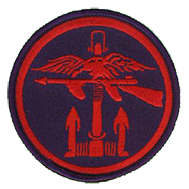Origins of the word Commando
From 1940, on the initiative of Winston CHURCHILL, the British Army undertook to form troops specialised in raids in order to take by surprise well-defined, but limited objectives.
In 1940, a “Commando” was a military unit, about of the size of a battalion, made up of volunteers for special services. They kept the insignia of their regiment of origin.
They formed a secret force whose only privilege was to find themselves their billet and rations. Each unit adopted the style of its Corps Commander.
In her novel “Officers and Gentlemen” published in 1955, the writer Evelyn WANGH wrote: “When the press got the permission to make use of the exotic term “COMMANDO”, its meaning became so large that it finally included curates on motorcycle.
Lieutenant-colonel Dudley CLARKE, who was charged to organise the Commandos, was also the one who gave them their name in remembrance of the “War of the Boers”.
There is no doubt that the British Army took on its own account a name of which it had learned all the value at its own expense during the “War of the Boers”, from 1899 to 1902.
The Boers “Commandos”, who were quite like a regular army for the Republics of Orange and Transvaal, gathered, generally by horse, valid men aged 16 to 20 for the compulsory military service. Each “Commando” was organised at the level of the electoral district. But quite a long time before the war, the Afrikaners colonists called “Commandos” the groups of action that, juste like the Portuguese, carried out punitive expeditions for their own sake against their African neighbours – Kaffirs, Zulus, Basotos, according to MURRAY’s English language dictionary (K2, 1892, page 67), which, in addition to two examples of 1884, quotes one dating back to 1834: Boers made a commando (raid) against our fathers…, this old appalling practice of military reprisals, the system of the “Commando”.
Thus, “Commando”, with the meaning of special unit, would have been introduced in South Africa by the Portuguese, but, obviously, it became well-known in Europe through the Boers colonists, first during the war 1899-1902 and then later during the Second World War.
